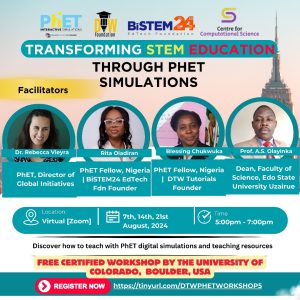DTW-PHET WORKSHOP 5 – REPORT
DTW – PhET workshop 5 was hosted by the DTW Foundation, in collaboration with PhET Global. The DTW Foundation in collaboration with some of its partners BiSTEM24 and Centre for Computational Science, known for its commitment to empowering educators and students through innovative learning tools, facilitated this exciting event.
First Synchronous Zoom Session – August 7th, 2024.
The first synchronous Zoom session of the DTW – PhET workshop 5 on August 7th, 2024, had over 260 STEM educators from across Nigeria and Africa in attendance, the session aimed to introduce PhET simulations, an interactive educational technology that enhances teaching in science and mathematics. This groundbreaking workshop was designed to equip educators with the tools and knowledge needed to revolutionize classroom learning using PhET simulations.
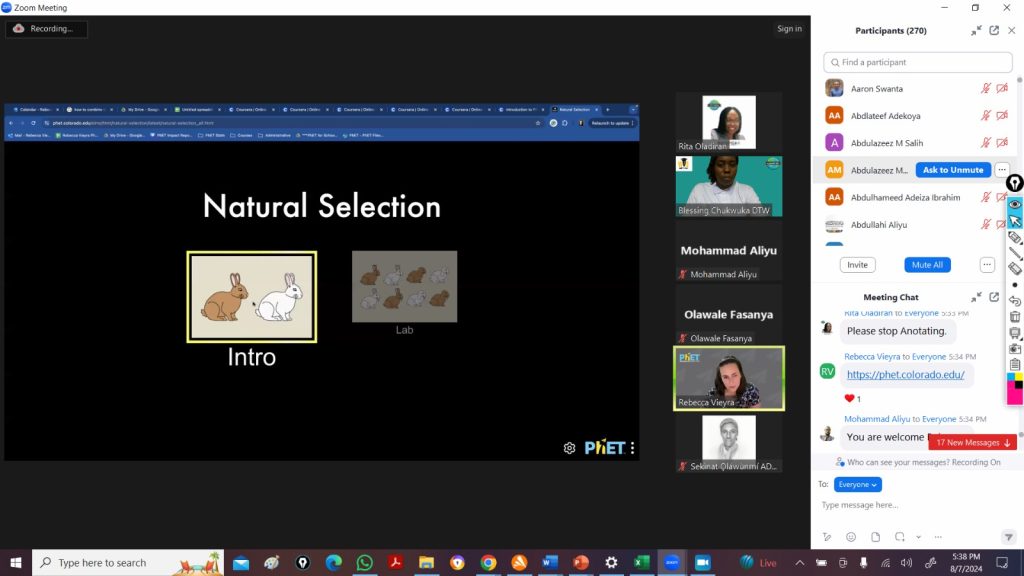
The session was exciting and invigorating, as I Mrs Blessing Seun Chukwuka, founder DTW Foundation, kicked off the meeting with introductions, welcoming my fellow facilitators: Dr. Rebecca Vieyra, Professor Akinola Samson Olayinka, Mrs Rita Oladiran and Ms Joy Chidimma.
After the warm welcome, Dr. Rebecca, Director of Global Initiatives PhET, Colorado Boulder, took the lead by walking participants through the PhET webite platform. She demonstrated how to access resources, register as educators, explore materials, and download simulations for offline use. This insightful tour helped participants navigate the PhET website more efficiently.
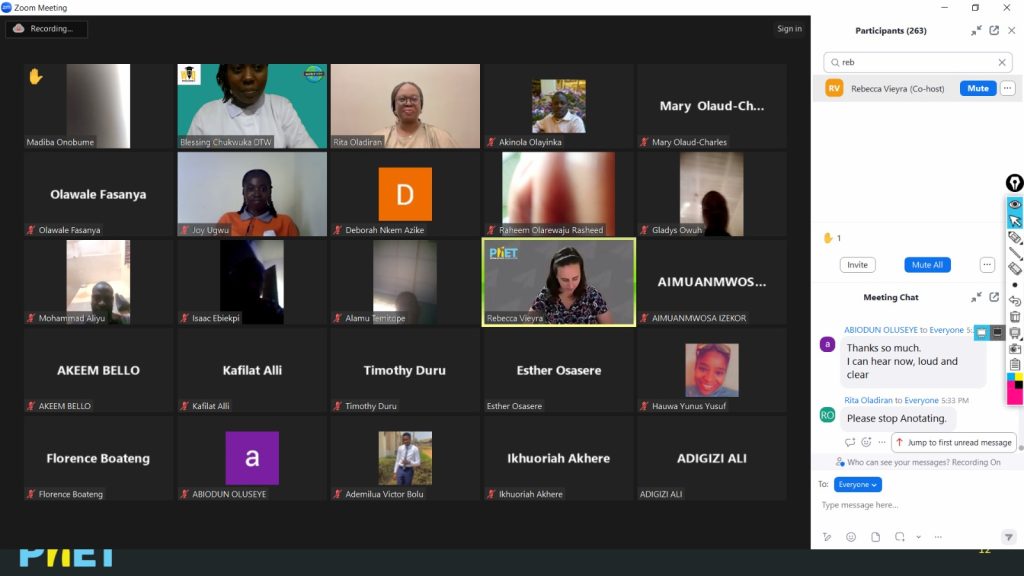
Next, Mrs Rita Oladiran, PhET Fellow, Nigeria, BiSTEM24 EdTech Founder, took over, highlighting the benefits of using PhET simulations in the classroom. Her session was highly engaging as she demonstrated several simulations, showing educators how these tools can enhance teaching and learning. This segment opened their eyes to the immense potential of integrating PhET into STEM education.
Following this, Professor Akinola Samson Olayinka, Dean, Faculty of Science, Edo State University Uzairue, dove into the pedagogical strategies for effectively using PhET simulations. He introduced whole class inquiry, interactive lecture demonstration, concept questions and other methodologies, providing a technical yet accessible approach to employing simulations in instruction. His presentation was informative and resonated well with the educators.
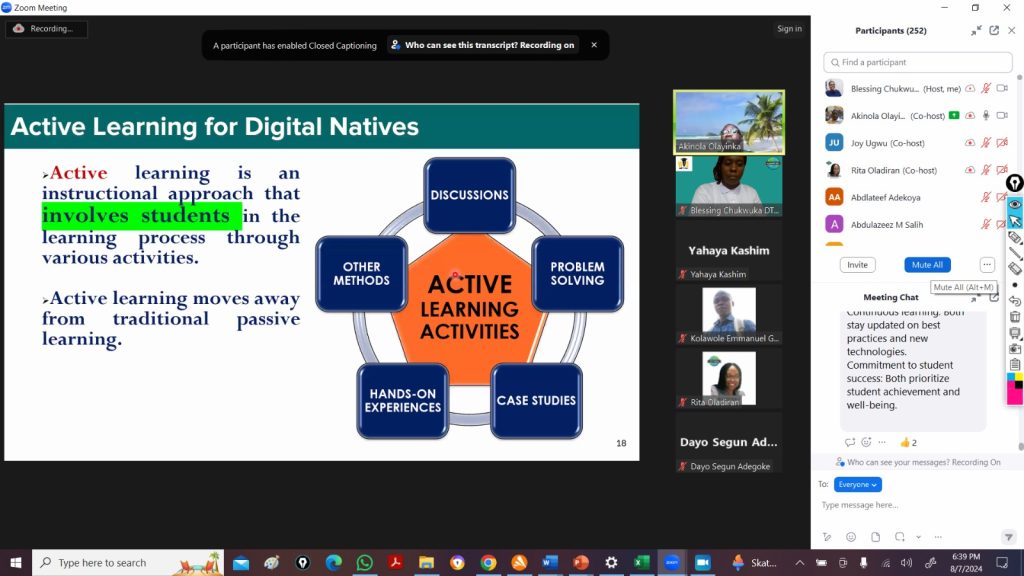
As we neared the end of the session, I guided the participants through the process of enrolling in the PhET course on Coursera. I encouraged them to use the coursera invitation links sent to their emails and to complete the course assignments step by step, providing them with a pdf course guide on the WhatsApp Group, which will further enable the team answer all the participants queries.
The session concluded with a lively Q&A, where we addressed educators’ questions and clarified their concerns. It was exciting to see so many educators eager to adopt new technologies and help their students learn in more engaging ways.
The video recording of this session is here; https://youtu.be/qq6fz1_SUEk
Second Synchronous Zoom Session – August 14th, 2024.
During the second synchronous Zoom session held on August 14th, 2024, I once again introduced the team of co-facilitators, which included Professor Akinola Samson Olayinka, Mrs Rita Oladiran, and Miss. Joy Chidinma and I, Mrs Blessing Seun Chukwuka. We began by addressing participants’ queries regarding access to the PhET course on Coursera. Many STEM educators had questions, and I walked them through solutions, guiding them on how to navigate the coursera platform and encouraging them to consult the PDF course guide and share any further queries in the WhatsApp group for support.
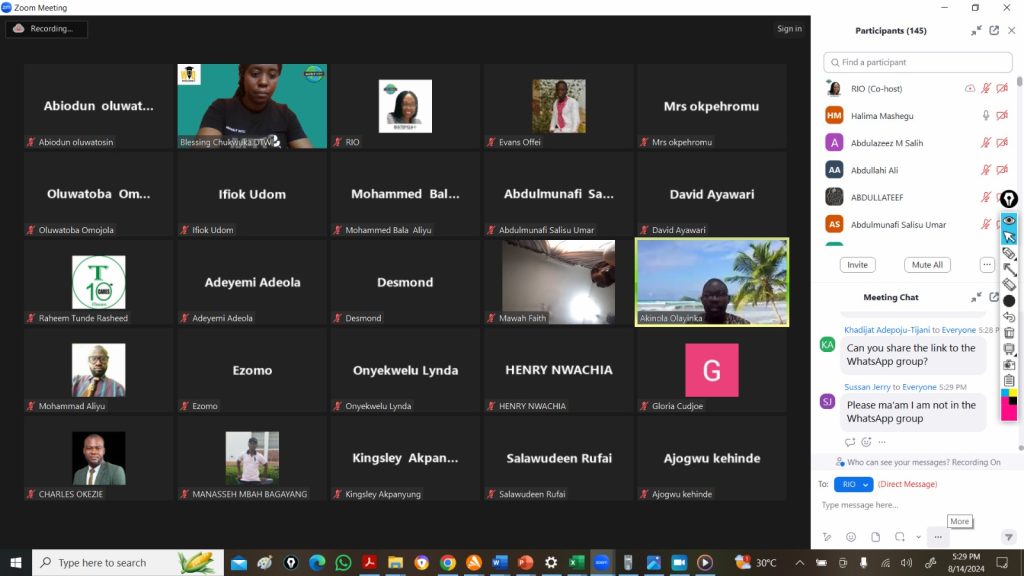
Once the questions were addressed, we transitioned into the main focus of the day’s webinar—Activity Design with PhET Simulations. Professor Akinola Samson Olayinka led this segment, starting with an overview of active learning and its importance in making classrooms more dynamic and engaging. He emphasized how PhET simulations can be integrated into active learning strategies, walking the participants through the process of designing activity sheets specifically tailored to PhET simulations. He provided clear guidelines on how to craft these activity sheets to maximize student engagement, stressing that although designing these sheets can be time-consuming, educators should prioritize specific key topics where such activities would have the greatest impact on students’ understanding.
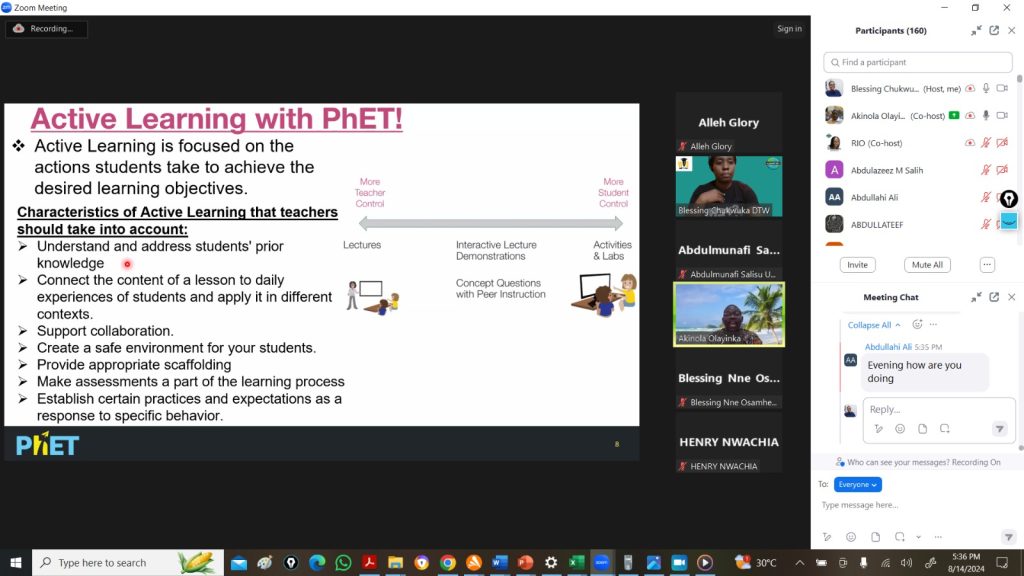
After Professor Akinola Samson Olayinka insightful presentation, which was met with a round of applause, we moved into the workshop phase. This part of the session was divided into breakout rooms for different subject areas: Physics, Chemistry, Biology, and Mathematics. Each breakout room focused on creating activity sheets and engaging with simulations in the context of the subject.
- Ms. Joy Chidinma, a seasoned chemistry educator, led the Chemistry session.
- Mrs Rita Oladiran handled the Biology session.
- Professor Akinola Samson Olayinka facilitated the Physics session.
- I, Blessing Seun Chukwuka, guided the Mathematics session.
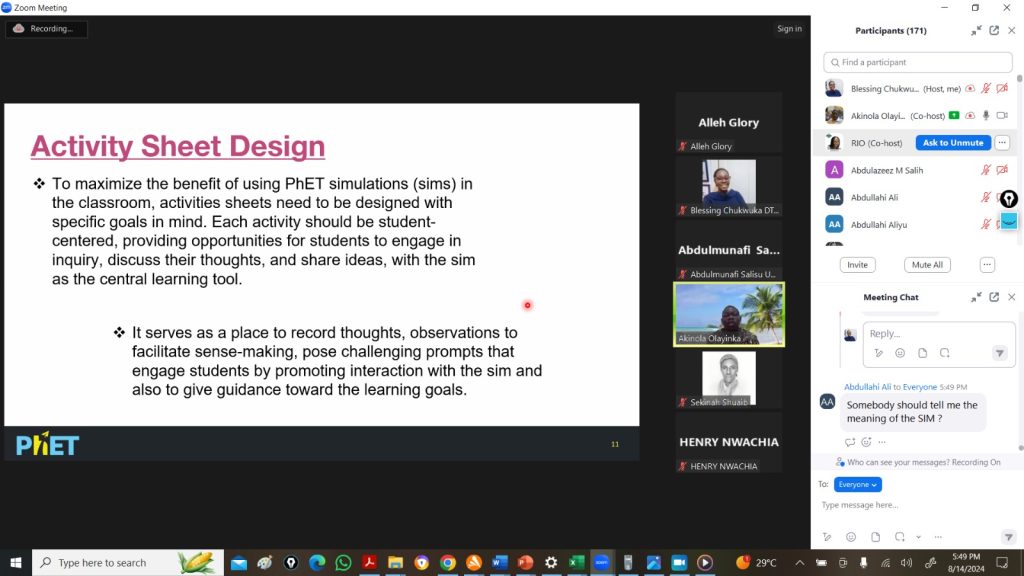
For about 40 minutes, the educators in each room worked through simulations, applying the knowledge from earlier in the session to answer questions on activity sheets. The breakout rooms were highly engaging, and when we reconvened in the main room, participants from each session shared their experiences and insights. The educators expressed great enthusiasm about how PhET simulations would enhance their teaching methods and better engage their students.
The session concluded with a vote of thanks to all 160 participants who joined the second synchronous session, marking another successful and exciting step in our PhET workshop series.
The video recording of this session is here; https://youtu.be/1FD_PFg3ldc
Third Synchronous Zoom Session – August 21st, 2024.
The third and final synchronous Zoom session of the PhET workshop took place on August 21, 2024, focusing on the implementation of PhET-based lesson plans. I, Blessing Seun Chukwuka, began the session by introducing the team of co-facilitators: Professor Professor Akinola Samson Olayinka, Mrs Rita Oladiran, Ms. Joy Chidinma, and myself. We then addressed participants’ queries regarding the Coursera platform before launching into the first presentation.
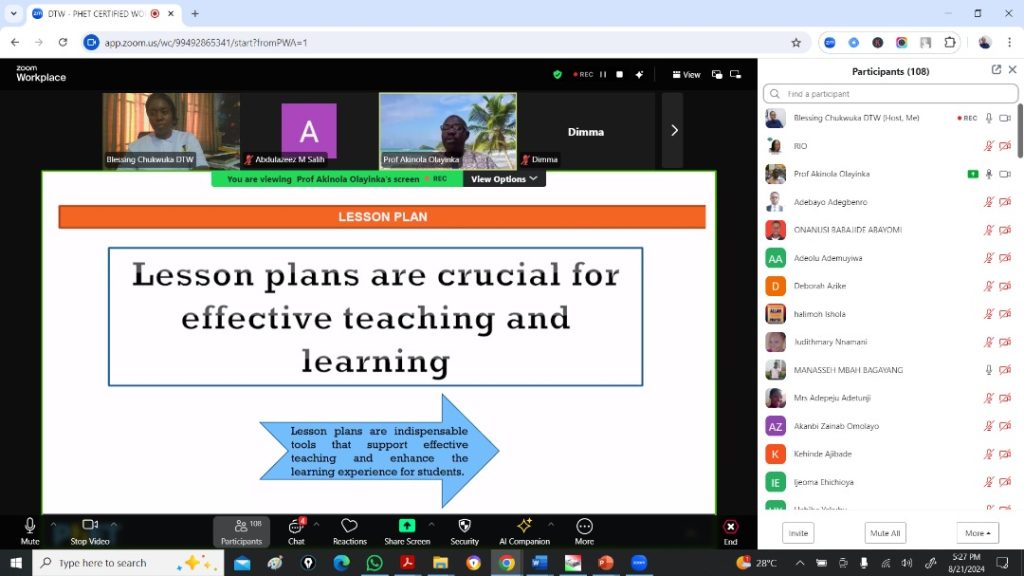
Professor Akinola Samson Olayinka led with a presentation on the importance of lesson planning when using PhET simulations. Many educators were surprised by the need for detailed PhET lesson plans, but Professor Akinola Samson Olayinka stressed that “failing to plan is planning to fail.” He explained that a well-structured lesson plan not only helps teachers manage their time but also improves classroom management during PhET-based activities.
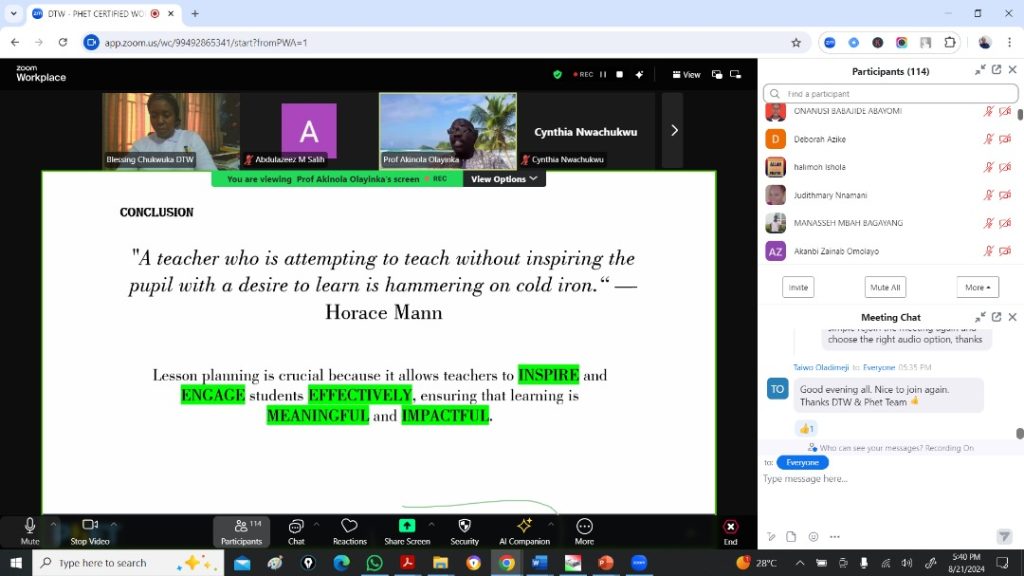
Following this, Mrs Rita Oladiran took over to explain the structure of a PhET lesson plan. She emphasized the importance of incorporating challenge prompts, keeping questions concise, and using open-ended questions to encourage critical thinking. She also highlighted the significance of assessing students’ prerequisite knowledge, introducing pre-lab questions to ensure they are well-prepared before diving into the main activity.
Next, Ms. Joy Chidinma shared her personal experience with implementing PhET-based lesson plans. As a former participant of the DTW PhET workshop and a certified PhET Simulation user, she provided valuable insights into her classroom implementation. She openly discussed her challenges, including making her activity sheets too wordy and dealing with time constraints. Her key advice to educators was to keep activity sheets simple, concise, and to “just start” using PhET simulations, assuring them that their proficiency would improve with practice. She also shared the positive impact PhET had on her students, particularly in understanding complex chemistry concepts more easily.
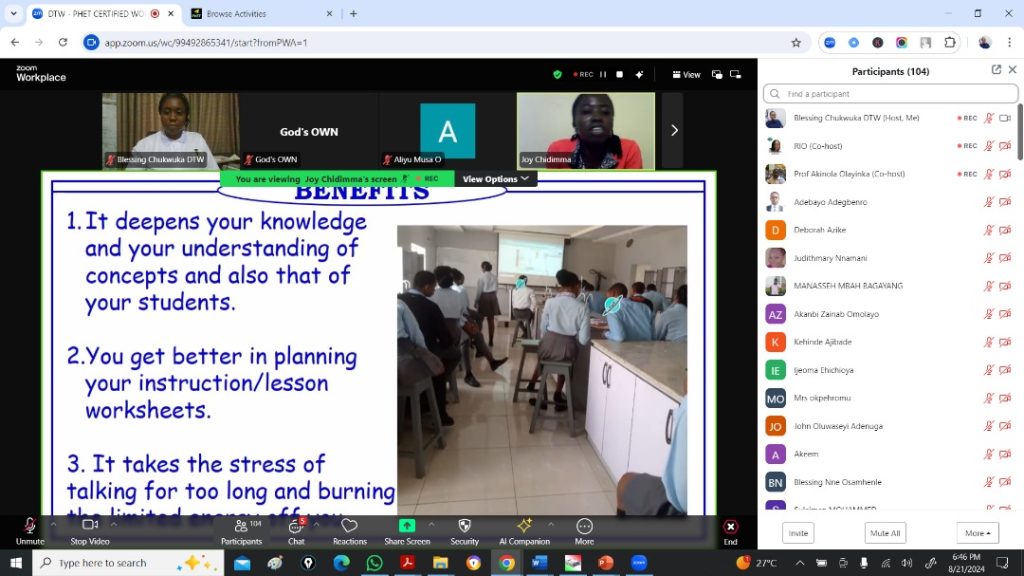
I, Blessing Seun Chukwuka, followed with a presentation on post-implementation reflections, emphasizing that reflection is a critical part of improving PhET lesson plans. I encouraged educators not to delay this process, as reflecting immediately or shortly after a lesson helps identify areas for improvement. I also recommended having a colleague observe and provide feedback during the session, particularly noting any questions on the activity sheet students struggled with, so that future activities could be adjusted accordingly.
The session concluded with a lively Q&A. One major topic of discussion was the concern that replacing traditional lesson plans with PhET-based plans might raise issues with external educational inspectors. Some educators expressed concerns that inspectors might not accept this new method, but many participants argued that the benefits of PhET would eventually be recognized and supported by inspectors and educational authorities. It was agreed that advocating for the widespread use of PhET simulations in classrooms across Nigeria should involve promoting its benefits to key stakeholders in education.
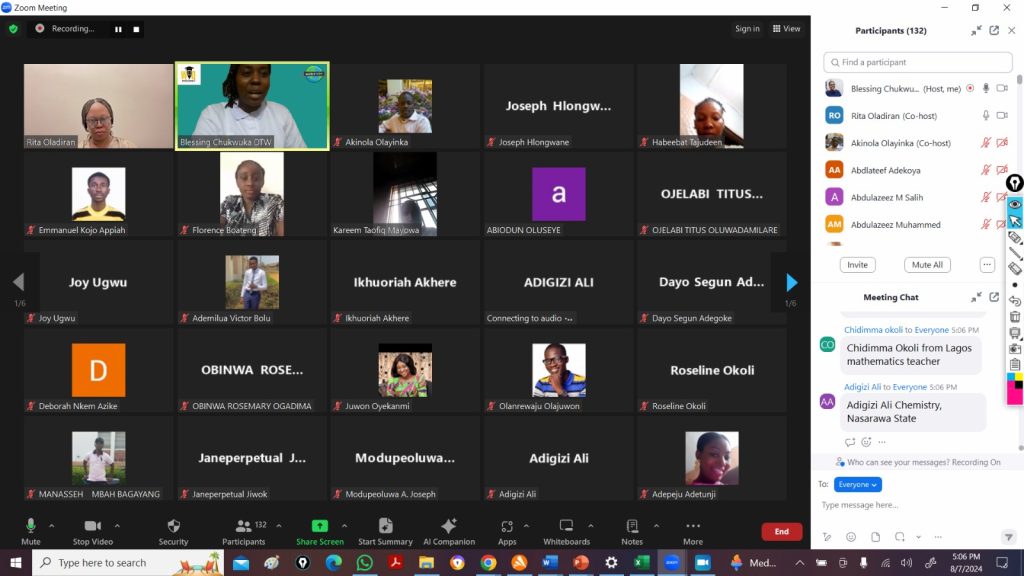
As the session came to a close, we addressed the final concern raised by several educators about the workload involved in creating PhET lesson plans. Some participants suggested creating a centralized database where Nigerian teachers who use the NERDC curriculum, could upload, share, and access PhET lesson plans for various topics and subjects. This would alleviate the burden of starting PhET Lesson plan from scratch and enable teachers to adapt and use existing lesson plans. We, as DTW Foundation, is committed to exploring this idea and promised to work on creating a platform where educators could collaborate on PhET lesson plans.
We wrapped up by thanking the over 100 participants who attended the final synchronous session, closing the curtains on a highly successful and enriching PhET workshop series.
The video recording of this session is here; https://youtu.be/ZG5F4nkJe4g
Conclusion
In conclusion, the three-part PhET workshop series hosted by the DTW Foundation proved to be an exceptional learning experience for over 1500 participant who registered for the workshop and finally the 300 plus active STEM educators participants across Nigeria. Each session, from the initial introduction to PhET simulations, through activity design, and finally, to the implementation of PhET-based lesson plans, was meticulously designed to empower educators with the tools and strategies to create more interactive and engaging classrooms.
Numerous educators have expressed their heartfelt gratitude and shared positive feedback about the PhET workshop series. Many participants proudly posted their Coursera certificates in the WhatsApp group with over 1200 community members, showcasing their successful completion of the PhET course. The feedback has been overwhelmingly positive, with educators highlighting how the workshop has deepened their understanding of using PhET simulations to enhance STEM education.
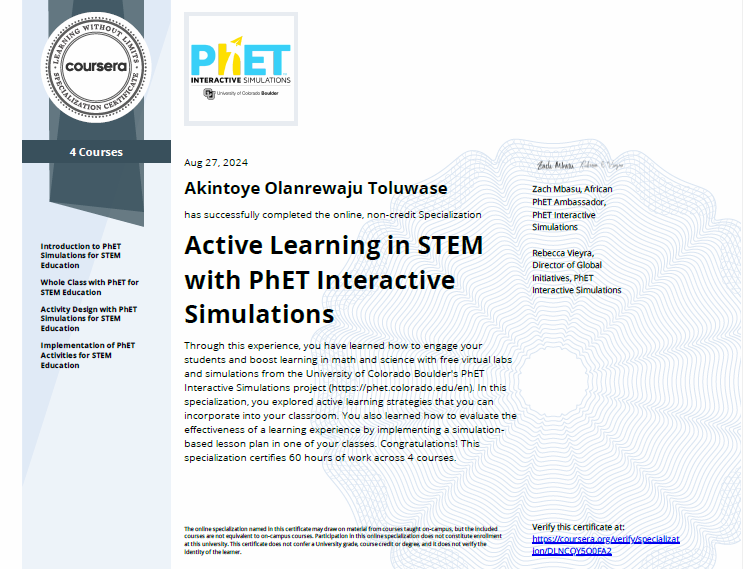
The window for completing the PhET course on Coursera remains open until September 30, 2024, allowing even more educators the opportunity to earn their certifications and continue developing their skills.
Throughout these workshops, educators expressed excitement and optimism about adopting PhET simulations to enhance student engagement and understanding. The possibility of creating a centralized lesson plan database to ease the burden of lesson planning resonated strongly with participants, and DTW Foundation is committed to exploring this initiative to support teachers further.
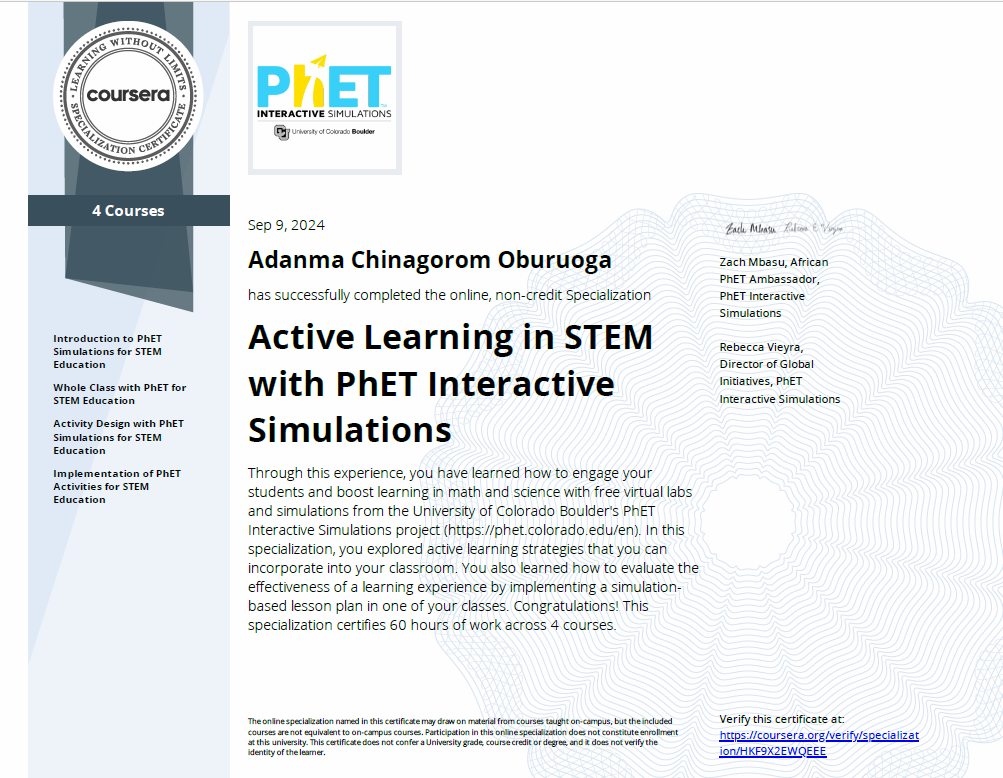
The positive feedback, alongside the growing number of certifications shared by participants, reflects the lasting impact of this initiative. By integrating PhET simulations into their lessons, educators are better equipped to inspire and educate the next generation of learners. As we move forward, the promise of exploring a centralized lesson plan database and fostering a supportive community of educators remains strong, ensuring continued collaboration and innovation in STEM education across Nigeria.

